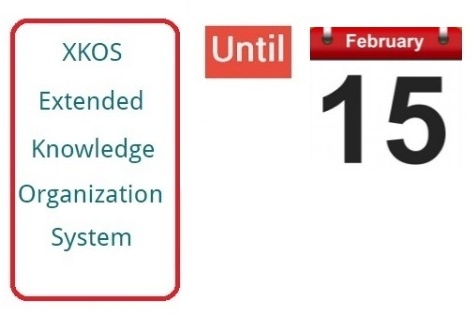Public Review of XKOS. Open until February 15, 2017


The Data Documentation Initiative (DDI) Alliance is pleased to announce the Public Review of XKOS - an RDF Vocabulary which extends the Simple Knowledge Organization System (SKOS) for the needs of statistical classifications. The comment period is open until February 15, 2017.
_____________________________________________________________________________________________________
XKOS - Extended Knowledge Organization System - leverages the SKOS for managing statistical classifications and concept management systems, since SKOS open standard is widely used.
# The XKOS vocabulary is licensed under a Creative Commons Attribution 3.0 License.
Linked Open Data (LOD) is used to create Web artifacts that machines can interpret, so publishing machine-readable statistical classifications and other concept management systems as SKOS instances was desired. Nevertheless, the XKOS developers found that SKOS was insufficient for the problem. No aspect of SKOS was found to be wrong, just incomplete. Therefore, an extension to SKOS, called XKOS, was proposed.
XKOS extends SKOS for the needs of statistical classifications in two main directions:
1. It defines a number of terms that enable the representation of statistical classifications with their structure and textual properties, as well as the relations between classifications.
2. It refines SKOS semantic properties to allow the use of more specific relations between concepts. Those specific relations can be used for the representation of classifications or for any other case where SKOS is employed.
Links to the specification and instructions for comment you can find HERE.
The DDI Alliance is eager to obtain Your feedback on this vocabulary.
The comment period is open until February 15, 2017.
***
Why use DDI?
The Data Documentation Initiative (DDI) is an international standard for describing the data produced by surveys and other observational methods in the social, behavioral, economic, and health sciences. DDI is a free standard that can document and manage different stages in the research data lifecycle, such as conceptualization, collection, processing, distribution, discovery, and archiving. Documenting data with DDI facilitates understanding, interpretation, and use -- by people, software systems, and computer networks. Use DDI to Document, Discover, and Interoperate! |
Because DDI is a structured standard, it facilitates machine-actionability and interoperability and it can actually be used to drive systems. Another feature of DDI is its focus on metadata reuse; “enter once, use often” means you can reuse metadata over the course of the data life cycle to avoid costly duplication of effort. DDI has advantages for several different audiences: Librarians -- Managers -- Repositories -- Researchers -- Developers |
The DDI community is a welcoming and diverse group of individuals and organizations located across the globe. There are many ways to join the community to learn more about and contribute to the development and adoption of DDI. |

